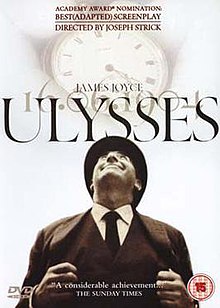Ulysses (1967 film)
| Ulysses | |
|---|---|

DVD cover
|
|
| Directed by | Joseph Strick |
| Produced by | Joseph Strick |
| Screenplay by |
Fred Haines Joseph Strick |
| Based on |
Ulysses by James Joyce |
| Starring |
Barbara Jefford Milo O'Shea |
| Music by | Stanley Myers |
| Cinematography | Wolfgang Suschitzky |
| Edited by | Reginald Mills |
| Distributed by | British Lion Films |
|
Release date
|
14 March 1967 (USA) June 1967 (UK) |
|
Running time
|
132 min. |
| Country | UK USA |
| Language | English |
| Budget | $900,000 |
| Box office | $2,300,000 (US/ Canada) |
Ulysses is a 1967 British-American drama film loosely based on James Joyce's novel Ulysses. It concerns the meeting of two Irishmen, Leopold Bloom and Stephen Dedalus, in the Dublin of 1904.
Starring Milo O'Shea as Leopold Bloom, Barbara Jefford as Molly Bloom, Maurice Roëves as Stephen Dedalus, T. P. McKenna as Buck Mulligan and Sheila O'Sullivan as May Golding Dedalus, it was adapted by Fred Haines and Joseph Strick, and directed by Strick. Haines and Strick shared an Oscar nomination for the screenplay.
This was the first film adaptation of the novel, 45 years on from its publication. It stands out over the subsequent film, Bloom, for its fidelity to the book and the fact that almost the entire screenplay is taken from lines in the book.
The film was shot on location in Dublin on a modest budget. Although the novel is set in 1904, the film portrays the city as it was in the 1960s.
Strick obtained a BAFTA and Golden Globe nomination on foot of the film as well as an Oscar nomination for Best Adapted Screenplay.
It was entered into the 1967 Cannes Film Festival. Festival organizers deleted some of the French subtitles without informing the director. When Strick noticed the deletions during the film's screening, "he stood up and yelled out that this film had been censored", Strick's son David told the Los Angeles Times. "He went upstairs to the projection booth and turned off the switches. He was then pushed down a flight of stairs by festival goons. My father and his associates withdrew the film immediately from the festival", David Strick said.
Pauline Kael described it as "an act of homage in the form of readings ... plus slides". Stanley Kauffmann called it "a facile and ludicrous reduction".
...
Wikipedia
